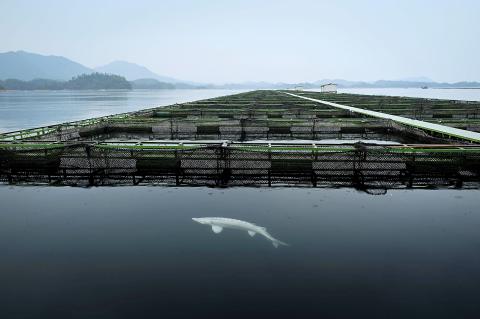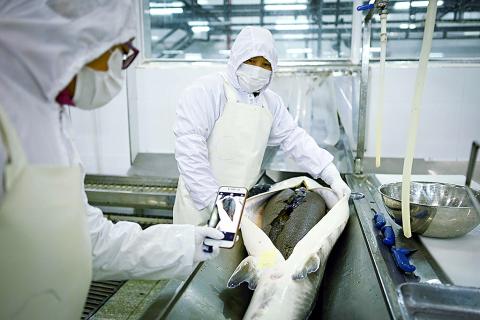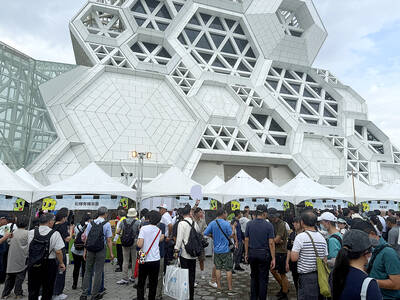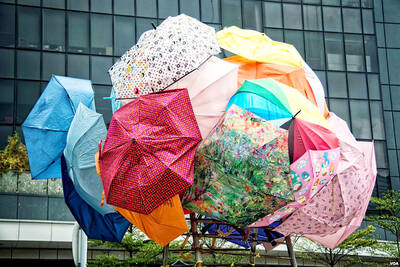The caviar on the menu of Michelin-starred restaurants may come from an unexpected place: China.
The country has endured embarrassing food scandals in recent years, but its sturgeon eggs have gained the respect of caviar connoisseurs around the world.
It has also become pricier for US buyers as Chinese caviar is among the slew of products hit with 25 percent tariffs in the US-China trade war.

Photo: AFP
The bulk of China’s production comes from a picturesque lake ringed by mountains in eastern Zhejiang province where industry leader Kaluga Queen breeds the giant fish.
The brand was created in 2005 by experts who worked for the ministry of agriculture and it now produces more than a third of the world’s caviar, making China the global leader.
The company’s sturgeon farm is a 20-minute boat ride away from the shore in Qiandaohu, or Thousands Islands Lake.

Photo: AFP
Qiao Yuwen, a breeder, stood at the edge of the pools where the animals live until they are between the ages of seven and 15. The biggest sturgeons can grow to be four meters long and weigh 300 kilos.
“They’re like our babies. We see them from when they’re very young, so it’s hard when they are sent to be slaughtered,” Qiao said.
“But there’s also, of course, the satisfaction of having contributed to making an exceptional product,” he said before throwing pellets containing shrimp, peas and vitamins to the fish.
‘PRICE OF A FERRARI’
For a long time, Iran and Russia fished sturgeon in the wild in the Caspian Sea.
But the fish population was nearly decimated by overfishing and poaching after the Soviet Union, which had regulated fishing, fell in 1991.
Sturgeon fishing in the Caspian Sea was banned in 2008 while sturgeon farms have sprung up everywhere, with Italy, France and China among the world leaders in the industry.
Kaluga Queen has 300 employees looking after some 200,000 sturgeons.
Once they reach sexual maturity, females are fished out and taken to a laboratory where they are stunned before their bellies are sliced open to extract the black eggs.
The roe is then washed, sorted, salted and placed in boxes.
Kaluga Queen produced 86 tonnes of caviar last year, most of it destined for exports, with half going to the European Union, 20 percent to the US and 10 percent to Russia.
Depending on the species, the price per kilo varies between 10,000 and 180,000 yuan (US$1,420 to US$25,600). Sturgeons producing the most expensive caviar can carry as much as two million yuan worth of eggs.
“It’s the price of a Ferrari,” said Xia Yongtao, the company’s vice president.
‘VERY GOOD CAVIAR’
Kaluga Queen has walked a “long road” to win the trust of customers since the company produced its first jar in 2006, Xia said.
Chinese caviar had to overcome scepticism from foreign clients who were used to headlines about food scandals, from contaminated milk powder to soy sauce containing arsenic and rice tainted with cadmium.
“A few years ago, customers were reluctant when we talked about Chinese caviar,” said Raphael Bouchez, president of Kaviari, a Paris-based supplier to renowned restaurants.
Bouchez convinced customers by explaining how Chinese producers raise fish and use methods that respect the environment.
“Chinese caviar, it must be said, is a very good caviar,” Bouchez said.
“That said, many of the chefs still do not want it. They prefer to have caviar from France, Uruguay or elsewhere,” he said.
Today, Kaluga Queen has an annual turnover of 220 million yuan and counts among its customers German airline Lufthansa and L’Atelier de Joel Robuchon, a two Michelin stars restaurant in Shanghai.
Distributors supply other restaurants around the world, and one buyer said he had delivered one shipment to Kim Jong-un, according to Xia.
French chef Guy Savoy, whose Paris restaurant has three Michelin stars and is rated the best in the world, uses Chinese caviar with skate wings and scallops.
“The label ‘made in China’ does not matter,” Savoy said. “The important thing is the quality of the breeding. Those supplied to us are of remarkable quality.”
Lily Liu, Kaluga Queen’s marketing manager, hopes someone else can try her company’s caviar.
“We hope that Donald Trump will taste our caviar and say: ‘I like it! Let’s reduce tariffs and help Chinese caviar conquer America!”

Water management is one of the most powerful forces shaping modern Taiwan’s landscapes and politics. Many of Taiwan’s township and county boundaries are defined by watersheds. The current course of the mighty Jhuoshuei River (濁水溪) was largely established by Japanese embankment building during the 1918-1923 period. Taoyuan is dotted with ponds constructed by settlers from China during the Qing period. Countless local civic actions have been driven by opposition to water projects. Last week something like 2,600mm of rain fell on southern Taiwan in seven days, peaking at over 2,800mm in Duona (多納) in Kaohsiung’s Maolin District (茂林), according to

It’s Aug. 8, Father’s Day in Taiwan. I asked a Chinese chatbot a simple question: “How is Father’s Day celebrated in Taiwan and China?” The answer was as ideological as it was unexpected. The AI said Taiwan is “a region” (地區) and “a province of China” (中國的省份). It then adopted the collective pronoun “we” to praise the holiday in the voice of the “Chinese government,” saying Father’s Day aligns with “core socialist values” of the “Chinese nation.” The chatbot was DeepSeek, the fastest growing app ever to reach 100 million users (in seven days!) and one of the world’s most advanced and

The latest edition of the Japan-Taiwan Fruit Festival took place in Kaohsiung on July 26 and 27. During the weekend, the dockside in front of the iconic Music Center was full of food stalls, and a stage welcomed performers. After the French-themed festival earlier in the summer, this is another example of Kaohsiung’s efforts to make the city more international. The event was originally initiated by the Japan-Taiwan Exchange Association in 2022. The goal was “to commemorate [the association’s] 50th anniversary and further strengthen the longstanding friendship between Japan and Taiwan,” says Kaohsiung Director-General of International Affairs Chang Yen-ching (張硯卿). “The first two editions

It was Christmas Eve 2024 and 19-year-old Chloe Cheung was lying in bed at home in Leeds when she found out the Chinese authorities had put a bounty on her head. As she scrolled through Instagram looking at festive songs, a stream of messages from old school friends started coming into her phone. Look at the news, they told her. Media outlets across east Asia were reporting that Cheung, who had just finished her A-levels, had been declared a threat to national security by officials in Hong Kong. There was an offer of HK$1m (NT$3.81 million) to anyone who could assist